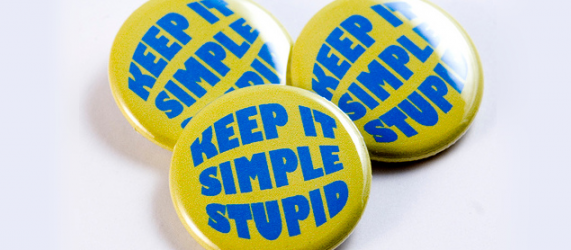KISS — Keep it simple, stupid.
I like this rule, and the more I train the more I realize that’s how it should be.
When you first get into exercise you just want to do it. But then you find out about all of this other information that you need to know to make your workouts, nutrition, etc. more effective. It’s overwhelming. However, it need not be that complicated.
Basically, the gist of KISS is keeping everything simple. There’s 4 things that you need to be doing to have good results with your training namely (1) training, (2) nutrition, (3) sleep, and (4) low levels of stress.
1. Training is best kept simple. Workout hard and rest hard. Put your best into your workouts, and they will give their best back to you. But when it’s time to rest, make sure you really rest. Don’t try to complicate things with so many exercises or so many varying repetition schemes – just work hard and you’ll get results. As you learn about your body and understand more then you may need to vary it up, but by then you’ll generally know enough that it shouldn’t be complicated. Light movement such as mobility or walking or light jogging can be an excellent enhancement to facilitate recovery.
If you ever find yourself thinking about programming for more than 10-20 minutes, you’re probably overcomplicating things.
Define goals -> Select exercises -> organize them into workouts -> Go do it.
2. Nutrition… keep it simple.
I think this article from the guys at LifeSpotlight (now defunct) says it very well. Essentially, just eat real food. Over in our beginners section we put together a great article that breaks it down into very simple, easy to follow guidelines.
Eat real foods. Lots of veggies and fruits, a fist-sized chunk of protein, some starches like rice or potatoes, and seeds or nuts.
3. Sleep is simple. Get 7-8 hours per night. Maybe a bit more or a bit less depending on your body’s needs. No exceptions. Make time if you have to. Regular sleep times to establish a good circadian rhythm are best. Avoid blue light such as computer and phone screens before sleep.
4. Low levels of stress. Self explanatory. Don’t worry so much. Training and sleeping help alleviate stress, but don’t get all worked up about anything going on in your daily lives. Just step back, take a few deep breaths and deal with it.
Try to schedule some ‘you’ time every week – massages, learn new sports or do other activities, meet new people, etc. Chronic levels of stress will beat you down hard and be disruptive to your training so try to stay as stress free as possible. Add in some movement work and deep breathing. Yoga or similar classes can be effective for relaxation.
These are the big 4 that have the greatest impact on your daily life and future. It’s easy to get caught up in details, but it is a good idea to step back every few weeks to take a look at the bigger picture.
This article was originally published August 19, 2009 on Eat Move Improve. Updated Dec 2016.
Questions about articles may be addressed to the Overcoming Gravity reddit.
Author: Steven Low
Steven Low is the author of Overcoming Gravity: A Systematic Approach to Gymnastics and Bodyweight Strength (Second Edition), Overcoming Poor Posture, Overcoming Tendonitis, and Overcoming Gravity Advanced Programming. He is a former gymnast who has performed with and coached the exhibitional gymnastics troupe, Gymkana. Steven has a Bachelor of Science in Biochemistry from the University of Maryland College Park, and his Doctorate of Physical Therapy from the University of Maryland Baltimore. Steven is a Senior trainer for Dragon Door’s Progressive Calisthenics Certification (PCC). He has also spent thousands of hours independently researching the scientific foundations of health, fitness and nutrition and is able to provide many insights into practical care for injuries. His training is varied and intense with a focus on gymnastics, parkour, rock climbing, and sprinting. Digital copies of the books are available in the store.
